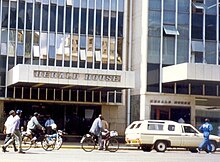The Herald (Zimbabwe)
 Herald House, Harare | |
| Type | Daily newspaper |
|---|---|
| Owner(s) | State-owned |
| Publisher | Zimpapers |
| Founded | 1891 |
| Language | English |
| Headquarters | Harare, Zimbabwe |
| Circulation | 6,000,000 |
| Website | www |
The Herald is a state-owned daily newspaper published in Harare, the capital of Zimbabwe.
History[]
Origins[]
The newspaper's origins date back to the 19th century. Its forerunner was launched on 27 June 1891 by William Ernest Fairbridge[1] for the Argus group of South Africa. Named the Mashonaland Herald and Zambesian Times, it was a weekly, hand-written news sheet produced using the cyclostyle duplicating process. In October the following year it became a printed newspaper and changed its name to The Rhodesia Herald.[2]
The Argus group later set up a subsidiary called the Rhodesian Printing and Publishing Company[3] to run its newspapers in what was then Southern Rhodesia.
After the white minority Rhodesian Front government unilaterally declared independence on 11 November 1965, it started censoring The Rhodesia Herald. The newspaper responded by leaving blank spaces where articles had been removed, enabling readers to gauge the extent of the censorship.[4][5][6]

Post Independence[]
In 1981, after Zimbabwe became independent, the government bought The Herald and other papers from the Argus group, using a US$20 million grant from Nigeria,[7] and established the [8] to operate them. The Trust created Zimbabwe Newspapers, Ltd., as the publisher of the papers.
For Robert Mugabe's 93rd birthday, the state-owned newspaper issued a 24-page supplement packed with goodwill messages from government departments.[9]
Sister papers[]
Other newspapers published by the same group include in Harare, The Chronicle and Sunday News in Bulawayo and the in Mutare.[10] The Chronicle, launched in October 1894 as The Bulawayo Chronicle, is the second oldest newspaper in the country.[11]
Controversy[]
The Herald has for some time been noted for its completely one sided reporting for the government of President Robert Mugabe and the Zanu-PF party, and its demonisation of the opposition party, the Movement for Democratic Change (MDC). It often accuses the MDC of being agents of colonial powers.[12]
The Herald faces limited competition from within Zimbabwe, mainly from independent newspapers, such as The Independent, due to very restrictive accreditation laws.[13][14] Many opposition media claim that the paper has evolved into an instrument of rather crude and aggressive propaganda.[15] (On the other hand, it often offers important insights into the workings of the Zanu-PF elite.) The editorial staff are open in their partisanship.[16] The paper makes no pretence of impartiality. The editors also support the restrictions on opposition newspapers. Their rationale for this is explained as follows by , a regular contributor to the Herald:
- "A free Press is vital for a vibrant society. But you have to understand the context in which the Zimbabwean State is operating. It is under siege from some Western countries, some of which – like the US – openly admit to sponsoring the media and various opposition groups to discredit the Government. ... How independent will the Press be if they are funded by an outsider who openly declares his intention to unseat the incumbent Government?"[citation needed]
In mid-May 2008, its website was briefly shut down by cyber hackers.[17]
Current editor[]
As of October 2013, the editor of The Herald was Caesar Zvayi.[18]
See also[]
- British South Africa Company Government Gazette (Originally published as a supplement to The Herald.)
- Media of Zimbabwe
- Zimbabwe Metro
References[]
- ^ Keppel-Jones, A. (1983). Rhodes and Rhodesia: The White Conquest of Zimbabwe 1884-1902. MQUP. p. 356. ISBN 9780773505346. Retrieved 14 April 2015.
- ^ "Zambezia journal, January 1970" (PDF). archive.lib.msu.edu. Retrieved 14 April 2015.
- ^ Nyarota, G. (2006). Against the Grain: Memoirs of a Zimbabwean Newsman. Zebra. p. 45. ISBN 9781770071124. Retrieved 14 April 2015.
- ^ Avrahm G. Mezerik (1966). Rhodesia and the United Nations: UN imposition of mandatory sanctions 1966 ... International Review Service.
- ^ Bennie Goldin (1 January 1990). The Judge, the Prince, and the Usurper-from UDI to Zimbabwe. Vantage Press.
- ^ Media Professionalism and Ethics in Zimbabwe: A Report Based on the Inquiry Carried Out by the Media Ethics Committee. Media Ethics Committee. 2002.
- ^ "WACC".
- ^ Ellias T. Rusike. See http://journ.ru.ac.za/rjr/Rusike_homepage.html
- ^ Dzirutwe, MacDonald. "As he turns 93, Mugabe dismisses corruption allegations | Top News | Reuters". af.reuters.com. Archived from the original on 22 February 2017. Retrieved 21 February 2017.
- ^ Zimbabwe Newspapers website. "Archived copy". Archived from the original on 17 July 2011. Retrieved 13 April 2011.CS1 maint: archived copy as title (link)
- ^ "Zimbabwe Press, Media, TV, Radio, Newspapers - television, circulation, stations, papers, number, print, freedom". pressreference.com. Retrieved 14 April 2015.
- ^ For example: "Tsvangirai confirms US, UK’s regime change agenda" Archived 28 June 2008 at the Wayback Machine, The Herald, 28 June 2008
- ^ "Zimbabwe Newspapers and News on the Internet". library.stanford.edu. Retrieved 14 April 2015.
- ^ Zimbabwe newspapers and news sites world-newspapers.com
- ^ Zimbabwe: Herald newspaper trimmed to size over propaganda botch-up
- ^ For example: "Time for MDC-T to take stock" Archived 28 June 2008 at the Wayback Machine, The Herald, 28 June 2008
- ^ "BBC NEWS - Africa - Hackers shut Zimbabwe website".
- ^ "The Herald | Zimbabwe's largest daily newspaper". herald.co.zw. Retrieved 14 April 2015.
External links[]
- The Herald newspaper website
- Newspapers published in Zimbabwe
- Mass media in Harare
- Publications established in 1891
- 1891 establishments in Southern Rhodesia